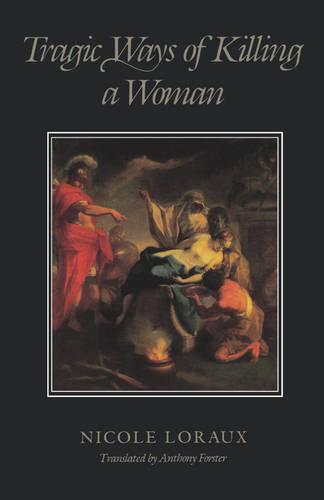Overview
In ordinary life an Athenian woman was allowed no accomplishments beyond leading a quiet and exemplary existence as wife and mother. Her glory was to have no glory. In Greek tragedy, however, women die violently and, through violence, master their own fate. It is a genre that delights in blurring the formal frontier between masculine and feminine. Through the subtlety of her reading of these powerful and ambiguous texts, Nicole Loraux elicits an array of insights into Greek attitudes toward death, sexuality, and gender.
Full Product Details
Author: Nicole Loraux
Publisher: Harvard University Press
Imprint: Harvard University Press
Edition: New edition
Dimensions:
Width: 14.00cm
, Height: 0.90cm
, Length: 21.00cm
Weight: 0.159kg
ISBN: 9780674902268
ISBN 10: 0674902262
Pages: 114
Publication Date: 01 October 1991
Audience:
College/higher education
,
Professional and scholarly
,
Undergraduate
,
Postgraduate, Research & Scholarly
Format: Paperback
Publisher's Status: Active
Availability: Out of stock

The supplier is temporarily out of stock of this item. It will be ordered for you on backorder and shipped when it becomes available.
Reviews
Remarkable not only for the breadth and precision of its scholarship and the refined subtlety of its interpretations but also for the wealth of meaningful connections it suggests... Challenging and brilliant throughout... Its exploration of the social, psychological, and physical implications of the deaths the poets contrived for their female characters adds a new dimension to our understanding of Attic tragedy. -- Bernard Knox New York Review of Books
A vivid demonstration of how women die in Greek tragedy... Exciting and erudite...the graceful scholarship and sound judgment that Loraux demonstrates should nudge the classical tradition toward more writing in this direction. -- John Chioles * New York Times Book Review * Remarkable not only for the breadth and precision of its scholarship and the refined subtlety of its interpretations but also for the wealth of meaningful connections it suggests... Challenging and brilliant throughout... Its exploration of the social, psychological, and physical implications of the deaths the poets contrived for their female characters adds a new dimension to our understanding of Attic tragedy. -- Bernard Knox * New York Review of Books * Loraux elegantly unfolds from the language of tragedy a discourse about women... This is a very fine book, which opens new dimensions in our understanding of Athenian civic ideology, tragedy's paradoxical nature as both relaxing and confirming boundaries, and the social dynamics of gender distinctions. -- William G. Thalmann * Philosophy and Literature *
A vivid demonstration of how women die in Greek tragedy...Exciting and erudite... the graceful scholarship and sound judgment that Loraux demonstrates should nudge the classical tradition toward more writing in this direction.--John Chioles New York Times Book Review
A vivid demonstration of how women die in Greek tragedy...Exciting and erudite... the graceful scholarship and sound judgment that Loraux demonstrates should nudge the classical tradition toward more writing in this direction. -- John Chioles New York Times Book Review Remarkable not only for the breadth and precision of its scholarship and the refined subtlety of its interpretations but also for the wealth of meaningful connections it suggests... Challenging and brilliant throughout... Its exploration of the social, psychological, and physical implications of the deaths the poets contrived for their female characters adds a new dimension to our understanding of Attic tragedy. -- Bernard Knox New York Review of Books Loraux elegantly unfolds from the language of tragedy a discourse about women... This is a very fine book, which opens new dimensions in our understanding of Athenian civic ideology, tragedy's paradoxical nature as both relaxing and confirming boundaries, and the social dynamics of gender distinctions. -- William G. Thalmann Philosophy and Literature
Author Information
Nicole Loraux was Professor of History and Anthropology of the Greek Polis at the École des Hautes Études en Sciences Sociales, Paris. She was the author of The Divided City, The Children of Athena, The Experiences of Tiresias, and Mothers in Mourning, among other titles.



